REPUBLIKA.CO.ID, MEDINA - Italian muslim community find Indonesian Muslims have interesting way in teaching Islam. As reported by Muhammad Hafil from Republika in Medina, Deputy Chairman of Italian Islamic Religious Community who also chairing ISESCO (Islamic Education, Scientific, and Culture Organization) Yahya Sergio Yahe Pallavicini, said that for hundreds years, Indonesian Muslims had used cultural approach in introducing the religion to people.
"It demonstrates that Islam teaches wisdom, and allow us to introducing its values through local culture," Pallavicini said in the sideline of Islamic Conference for Ministers of Culture, held by ISESCOn madine, Saudi Arabia on Wednesday.
After several years of study, Pallavicini found that Indonesia had different approach from Saudi in introducing Islam.
"Saudi's way is good but it's not easy to implement it Italy," Pallavicini said.
According to Pallavicini, Italy may find Indonesian way has a more acceptable approach. Many non-muslims in Italy are mot interested in Saudi's approach. He said his interest growing after Indoneisian Minister of Education and Cultire, Muhammad Nuh, explained about nine Indonesian preachers known as Wali Songo.
Peaceful way
Earlier Nuh explained that one of nine preachers, Sunan kalijaga, used cultural approach in introducing Islamic values to local community in Java. The minister said that culture had three aspects namely expression, substance, and values. It's quite often people are fooled by expression only.
"On contrary, Sunan Kalijaga thought that Islamic substance and values were more important than expression," Nuh said.
Hence, transformation from Hinduism and Buddhism to Islam went well and peacefully. While Introducing Islam in Cordoba, Spain, was quite opposite because when Islam came tp the country, local culture was abolished and only physical building were allowed. Then when the Muslims were defeated, all Islamic teachings were also abolished.
"It's like saying 'a coup for a coup'," Nuh added.


